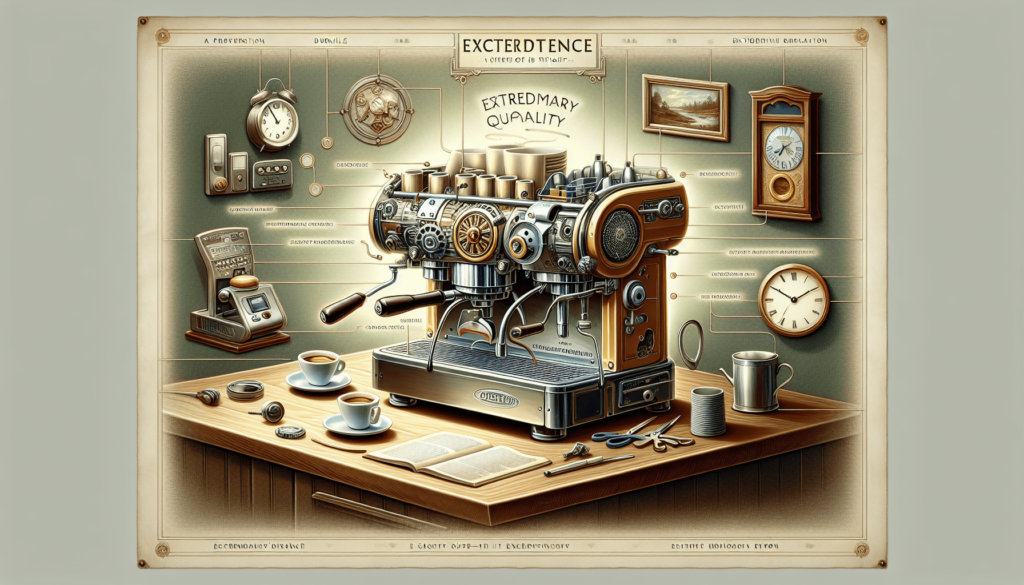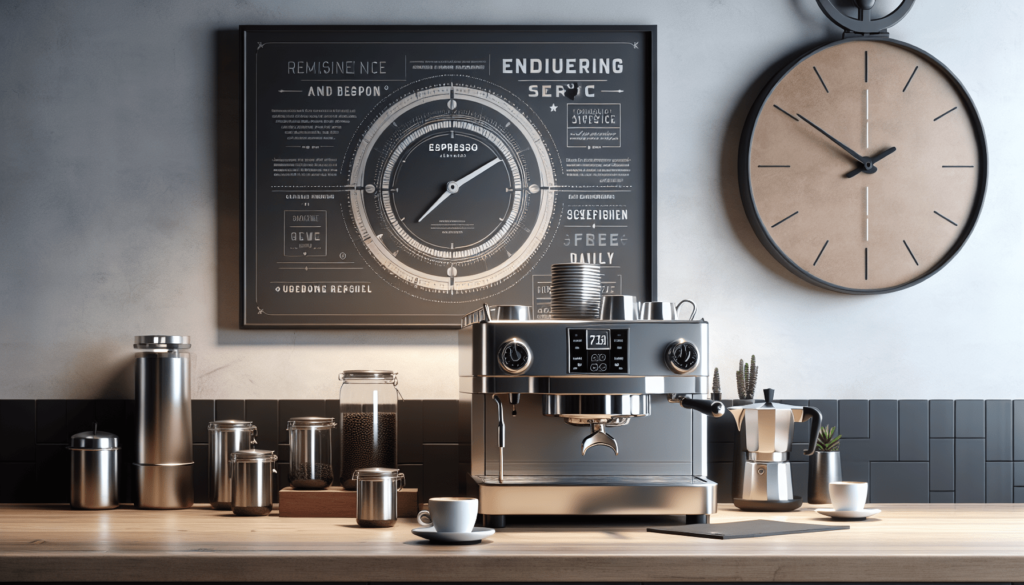Have you ever wondered how many years your espresso machine will last? If you have, you’re not alone. Owning an espresso machine can be a significant investment, both for your wallet and for your daily coffee rituals. The longevity of your machine can directly impact how much value you get out of it and how often you might need to consider replacements or repairs.
Factors Influencing the Longevity of Your Espresso Machine
Build Quality and Brand Reputation
The first aspect to consider is the build quality and reputation of the brand. High-quality brands often use better materials and engineering methods in their machines, which results in a longer lifespan.
- Premium Brands: Companies like Breville, De’Longhi, and Jura are known for their reliable and long-lasting machines.
- Mid-Range Brands: Brands like Gaggia and Saeco offer good longevity but may not have the same lifespan as premium models.
- Budget Brands: These often have shorter lifespans due to lower build quality and simpler technology.
Frequency of Use
How often you use your espresso machine will greatly impact its longevity. Machines that are used multiple times a day will wear out faster than those used less frequently.
- Daily Use: If you brew coffee multiple times daily, expect a lifespan of around 5 to 7 years.
- Occasional Use: Machines used once every few days or weekly could last up to 10 years or more.
- Commercial Use: In a café setting where machines operate almost non-stop, the lifespan could be reduced to 1 to 2 years due to high wear and tear.
Maintenance and Cleaning
Regular maintenance and cleaning can significantly extend the life of your espresso machine. Neglecting this aspect could lead to various operational issues and reduced lifespan.
- Daily Cleaning: Removing coffee grounds, rinsing the portafilter, and wiping down the machine.
- Weekly Maintenance: Descaling the machine, emptying drip trays, and cleaning the milk frother.
- Annual Service: Some high-end machines require a professional service annually to check internal components and ensure everything is running smoothly.
Water Quality
The quality of water you use can have a direct impact on your machine’s longevity. Hard water can cause calcium buildup, leading to faster degradation of internal parts.
- Soft Water: Less likely to cause buildup, extending the machine’s lifespan.
- Hard Water: Requires more frequent descaling and can shorten the lifespan.
Usage Habits
Your specific usage habits can also play a role. For example, continuously running the machine at high temperatures or brewing very fine coffee grounds can exert additional pressure on the machine, causing it to wear out faster.
Common Signs Your Espresso Machine May Need Replacing
Reduced Performance
One of the first signs that your espresso machine may be nearing the end of its life is reduced performance. This includes longer brewing times, inconsistent coffee quality, or a noticeable reduction in steam pressure.
Frequent Repairs
If you find yourself needing frequent repairs for different components of the machine, this is a clear indicator that it may be time to consider a replacement.
Outdated Technology
Technology in coffee machines evolves rapidly. If your machine is an older model, it might lack the latest features like programmable settings, Bluetooth connectivity, or advanced filtering systems.

Estimating Lifespan by Machine Type
Manual Espresso Machines
Manual espresso machines, also known as lever machines, can last a very long time. With few electrical components and mostly mechanical operations, these machines can often be maintained and repaired over decades.
- Typical Lifespan: 10-20 years
- Maintenance Required: Regular lubrication and mechanical checks
Semi-Automatic Machines
Semi-automatic machines offer a balance between control and convenience. They typically have a longer lifespan than fully automatic machines but may require more manual intervention and maintenance.
- Typical Lifespan: 7-12 years
- Maintenance Required: Frequent cleaning and occasional part replacements
Fully Automatic Machines
Fully automatic machines are popular in domestic settings for their ease of use. However, they often have more complex components, which can lead to a shorter lifespan.
- Typical Lifespan: 5-10 years
- Maintenance Required: Regular descaling, filter changes, and occasional electrical repairs
Super-Automatic Machines
Super-automatic machines can grind, brew, and steam milk with the push of a button. They are highly convenient but also come with a lot of electronic components, which can wear out faster.
- Typical Lifespan: 5-8 years
- Maintenance Required: Regular cleaning schedules, software updates, and component repairs
Extending the Life of Your Espresso Machine
Regular Cleaning Routine
Establishing a regular cleaning routine can significantly extend the life of your espresso machine. Remove coffee residues, clean the milk frother, and empty the drip trays and water reservoirs frequently.
Use High-Quality Water
Using filtered or bottled water can minimize mineral buildup and extend the lifespan of your machine. If your tap water is hard, it is advisable to invest in a good water filter.
Scheduled Maintenance
Some machines come with a maintenance schedule either in the user manual or as an app reminder. Adhering to this schedule ensures that all components are checked and serviced regularly.
Part Replacements
Be proactive about replacing small parts like gaskets, portafilters, and filters. Regular replacements can prevent bigger issues and extend the machine’s operational life.

Real-world Examples of Espresso Machine Lifespans
Understanding from real-world examples can also be useful. Below are some common brands and expected lifespans based on user reviews and expert opinions:
| Brand | Machine Type | Expected Lifespan | Notes |
|---|---|---|---|
| Breville | Fully Automatic | 7-10 years | Reliable with regular maintenance |
| De’Longhi | Super-Automatic | 5-8 years | High-quality, moderate lifespan |
| Jura | Super-Automatic | 8-12 years | Premium, longer lifespan if well-maintained |
| Gaggia | Semi-Automatic | 7-12 years | Durable, needs regular cleaning |
| Saeco | Fully Automatic | 5-10 years | Budget-friendly, shorter lifespan |
| La Marzocco | Manual/Commercial | 15-20 years | Built to last, extensive lifespan |
| Rocket Espresso | Manual/Semi-Automatic | 10-15 years | High-end, well-crafted |
Conclusion
Determining the longevity of your espresso machine involves multiple factors including build quality, frequency of use, maintenance, and water quality. While premium brands offer a longer lifespan, they also require a higher initial investment. Regular maintenance, proper cleaning, and using high-quality water can extend the life of your machine, ensuring you get the best return on your investment. By understanding the different types of machines and their expected lifespans, you can make informed decisions about when it might be time to upgrade or replace your current model.
Your espresso machine, whether it’s a high-end model or a budget-friendly option, deserves the proper care and attention to ensure it serves you well for years to come. By following these guidelines and keeping an eye on the signs of wear, you can enjoy the perfect cup of coffee without frequent interruptions caused by a malfunctioning machine.
